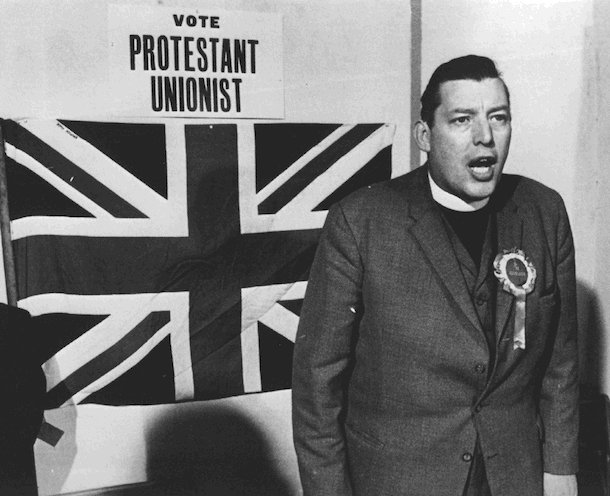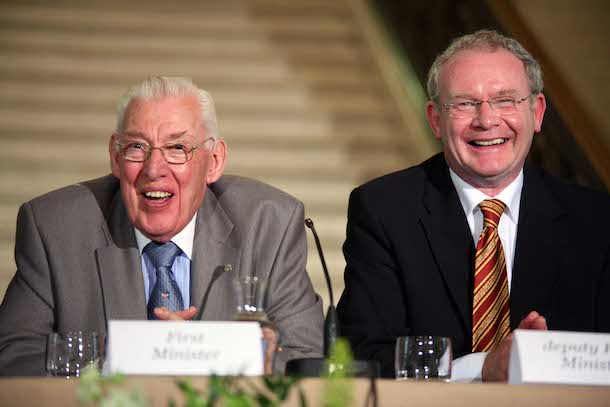15 September 2014
Ian Paisley: The ‘No’ man who said ‘Yes’– by Gerry Adams

I GREW UP with Ian Paisley. His was a name I heard as a child playing in the streets of west Belfast. I wasn’t particularly politically conscious and Paisley’s fame at that time was primarily around his anti-Catholic rhetoric.
Although a religious minister, Paisley – like other firebrand Protestant clergy before him – also involved himself in unionist politics. At a time of increasing unemployment, the aim of his Ulster Protestant Association was “to keep Protestant and loyal workers in employment in times of depression, in preference to their Catholic fellow workers”. But it was the Divis Street riots in 1964, when I was 15, that brought him to real prominence.
There was a British general election and Sinn Féin, which was banned, was standing candidates as independent republicans. It had opened an office in Divis Street, which I passed each day on my way to and from school. An Irish Tricolour was placed in the window. Paisley threatened that if it wasn’t taken down he would march from City Hall and remove it. The unionist candidate in the election, Jim Kilfedder, also demanded its removal and the unionist Minister for Home Affairs, mindful that it was election time and not wanting to alienate loyalist voters, duly ordered the Royal Ulster Constabulary to use force to take it.
Fifty RUC men used pickaxes to smash their way into the office and seized the flag. The next day, another Tricolour took its place and the RUC returned to smash the window and take this too. Two days of rioting followed. Two weeks later, a victorious Kilfedder used his first public remarks as the new MP for west Belfast to thank Paisley, without whose help “it could not have been done”.
The Divis Street event set the template for much of Paisley’s subsequent political career. It also had the additional effect of encouraging me to become politically curious and then active. I went off and got a copy of the notorious Special Powers Act. I read it and other material and began to learn about the causes of discrimination and sectarianism. I started folding election leaflets for the republicans.
In the late 1960s, the “Paisleyites”, as they were generally called, organised counter-demonstrations as a way of disrupting civil rights marches. Their actions increased tension. When the pogroms occurred in Belfast in 1969, the Paisleyites were in the vanguard of the attacks on Catholic areas. And from that point on the political situation became increasingly militarised. During the 1970s, ’80s, ’90s and into the new century, Paisley and his Democratic Unionist Party, which he established in 1970, opposed every effort at reform or to find an agreement. He worked closely with loyalist paramilitary organisations to bring down the power-sharing executive in 1974 and established his own paramilitary organisations as a means of advancing his political goals, including the Third Force and Ulster Resistance.
He was the famous “No” man of Northern politics who thundered out “Never, never, never” as he rejected the Anglo-Irish Agreement at a rally in front of Belfast City Hall in 1985. These images will now be replayed in the days that follow. But they will be juxtaposed with photographs and film of a laughing, smiling Paisley sitting next to an equally laughing and smiling Martin McGuinness, Sinn Féin’s deputy First Minister.
When Paisley finally led his party delegation into a meeting with me and a Sinn Féin delegation in March 2007, there were many who doubted it would work. The press conference image of Paisley and I sitting side by side and announcing the re-establishment of the political institutions flabbergasted those who had lived through decades of conflict.
But it worked.

Ian Paisley and Martin McGuinness got on famously. Paisley was still a unionist, McGuinness still a republican. It is to his credit and Martin McGuinness’s great patience that they created a space where each could find common cause with the other.
Ian Paisley embraced the new dispensation. At his first meeting with Martin McGuinness, he declared: “We don’t need Englishmen to rule us. We can do that ourselves.”
He travelled to Dublin. He visited the site of the Battle of the Boyne at the invitation of the Irish Government. He was at all times respectful and courteous in our meetings and good-humoured.
His wife, Eileen, was also a benign and positive influence. Ian Paisley will be remembered for the bad days but, after decades of dissent, he chose to build a new future for the people of the North and of the island based on respect and dialogue. He should be remembered for that as well.
◼︎ This article first appeared in the Guardian newspaper’s ‘Comment is Free’ pages.
Follow us on Facebook
An Phoblacht on Twitter
Uncomfortable Conversations

An initiative for dialogue
for reconciliation
— — — — — — —
Contributions from key figures in the churches, academia and wider civic society as well as senior republican figures





